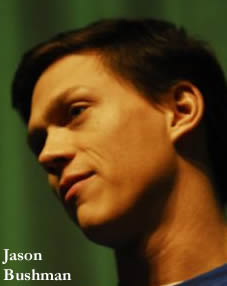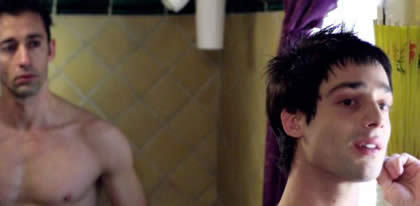Writer/Director Jason Bushman makes his feature directing debut with Hollywood je t’aime. Hailing from the un-homo-friendly deserts of West Texas, Jason has dedicated his work to telling out, queer stories. He is a graduate of UCLA and a committed meditator and  yogi, combining his personal practice with part time residency in Paris and Los Angeles. His short, Serene Hunter screened at Slamdance and Outfest among others
yogi, combining his personal practice with part time residency in Paris and Los Angeles. His short, Serene Hunter screened at Slamdance and Outfest among others
Bijan Tehrani: How did you come up with the idea for Hollywood Je’Taime?
Jason Bushman: I came up with the idea for Hollywood Je’Taime when I made a short film called Serene Hunter in 2007. I cast one of my best friends to be the lead actor in it, who is a French man who never acted before in his life, and he turned out to be really, really wonderful in it. He was here in California for Out Fest in 2007 and just experiencing all of his good reviews for the film Serene Hunter and he spoke to me about quitting his job and pursuing acting full time. Now this is someone who is in his late thirties who does not speak perfect English by any means and it just got me thinking; how would it be if this person came to Los Angeles, as so many people do, from around the country and around the world with the hopes of becoming a move star?
Bijan: Did you complete the script before filming or did you improvise as you went along?
Jason: No, the film was entirely scripted.
Bijan: This is a very interesting project because it shows another side of Hollywood through very interesting characters. Were these characters invented or were they based on real people?  Jason: I think that all the characters are based on real people to varying degrees. I have a lot of drag queen friends, so I think that the Norma character who is kind of the jaded and cynical older drag queen is somewhat based on myself. So I feel that the characters reflect on me and also the other people I know. One of my best friends is transgendered and has recently begun the transition of becoming male to female and I was thinking a lot about that when I wrote the character of Kaleesha, who is also transgendered. The Dealer character played by Kat Allen was definitely an amalgam of a lot of people. Only the lead character of Jerome is based specifically on someone that I know and that is my friend Eric who played the role, while the other characters are mixtures of me and others.
Jason: I think that all the characters are based on real people to varying degrees. I have a lot of drag queen friends, so I think that the Norma character who is kind of the jaded and cynical older drag queen is somewhat based on myself. So I feel that the characters reflect on me and also the other people I know. One of my best friends is transgendered and has recently begun the transition of becoming male to female and I was thinking a lot about that when I wrote the character of Kaleesha, who is also transgendered. The Dealer character played by Kat Allen was definitely an amalgam of a lot of people. Only the lead character of Jerome is based specifically on someone that I know and that is my friend Eric who played the role, while the other characters are mixtures of me and others.
Bijan: The acting in the film is very Natural and believable. How did you go about working with the actors?
Jason: I am an actor myself, and that is another big part of how the story came to me. I came to Los Angeles fourteen years ago from west Texas to pursue an acting path. After studying acting for a long time I realized that every actor is different, I found that out as an actor myself and while working with actors. Some actors need a lot of background work and improvisation while some need very little and do not want to be told very much. So I am glad that you appreciated the performances in the film because it was my own acting background that enables me to work with the actors and rehearse with everybody to get a sense of what kind of actor they were what kind of instruction they needed and then try my best to direct them to the best of my ability. 
Bijan Tehrani: Describe the visual style of the film and how much of the visual aspects of the film were developed on set as opposed to in the editing room?
Jason: Our Director of photography is wonderful, her name is Allison Kelly and from the start we wanted to have a Midnight Cowboy type of feel to the film, which is a gritty movie from the late sixties that showed the real side of New York at that time. I live In Silver Lake and I feel that oftentimes when Los Angeles is represented on film it is shown as this fancy place, like Beverly Hills and Santa Monica. You never see my real Los Angeles which is kind of a dirty place and a little grungy, but at the same time wonderful. So we definitely tried to blend those two qualities, by showing the grittiness of Los Angeles but with a magical quality. Another influence of the look of the film was The Wizard of Oz. So to try and strike that balance between Midnight Cowboy and The Wizard of Oz was our goal from the get go.  Bijan: How have reactions been to the film so far?
Bijan: How have reactions been to the film so far?
Jason: I’ve been really pleased with the reactions. We’ve only had three screenings at three different festivals and we’ve had solid audiences for every single one, so I’ve been really pleased. It’s not a broad comedy, where you’re laughing every thirty seconds, but it definitely has comedic points. I think that the first screening that I watched, I was surprised at how much people laughed because I think that it’s a very serious film as well. But I’ve noticed (especially in screening outside of Los Angeles), people really taking in the film, so I’ve been really thrilled with how it’s going.
Bijan: As far as the dialogue I the film, were actors free to improvise or did they go with what was exactly on the script.
Jason: I wouldn’t say that I was crazy strict with the script, but I’m also not the type to just give someone and outline of a scene and say “play it the way you want to play it”. I always encourage actors to say lines in the way that is most natural to them but I think the problem you run into a lot of the times is that they end up saying something else. We did some improvisation but the most part, what was on the script is what was in the final film.
Bijan: Do you have a theatrical deal in place for the film?
Jason: We don’t have a solid deal in place yet, but we have had a couple of offers that we are weighing right now and hopefully we will have a theatrical release or at the very least a DVD. It’s very hard for independent films to make money through a theatrical release and  that’s why I love the festival circuit because not only is it a theatrical release but it is people who are really passionate about film.
that’s why I love the festival circuit because not only is it a theatrical release but it is people who are really passionate about film.
Bijan: Shouldn’t more realistic and honest films like yours gain more recognition from the Academy Awards?
Jason: Well I think that would be amazing. I think that the Academy is largely connected to the studio system and it is rare that a film that is made outside that system really breaks through. But I definitely feel that films like ours should gain recognition.
Bijan: Do you have any future projects in mind?
Jason: I’ve been writing scripts for a long time, I’m actually newer to directing that I am to writing. So I have four or five scripts that I think are ready and also some other ideas that are more queer specific projects like Hollywood Je’Taime to some projects that aren’t queer specific. I have a script about four fifteen year olds who are studying Beowulf and the nature of heroism and over the course of it they all get to portray Beowulf and monster, so I have all kinds of scripts in mind.
Bijan: Thank you very much for your time and good luck with Hollywood Je’Taime!
Jason: Thank you so much!

